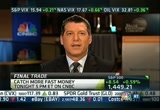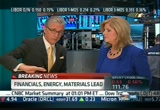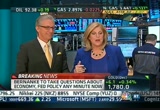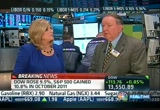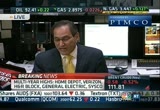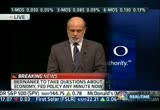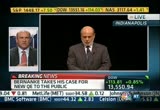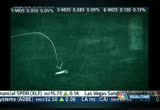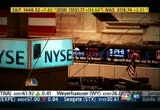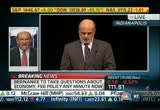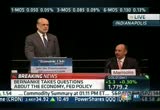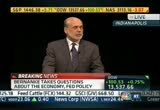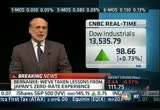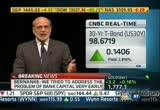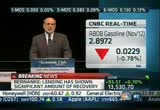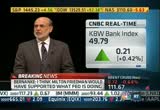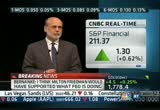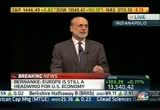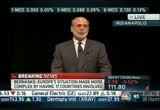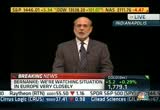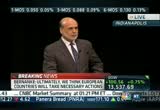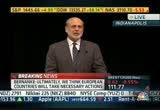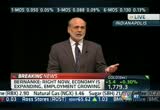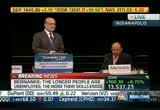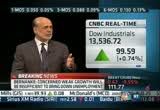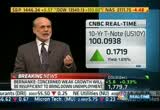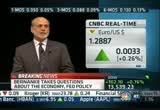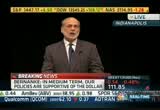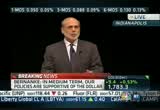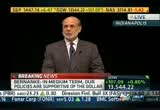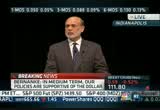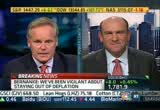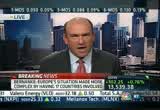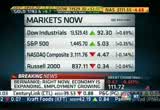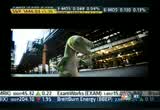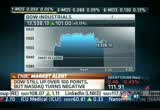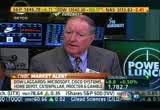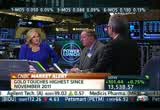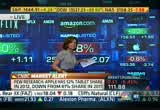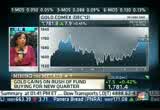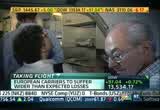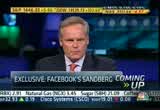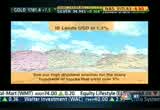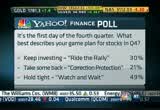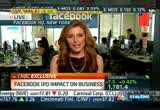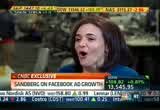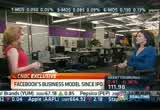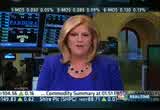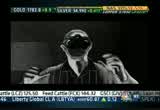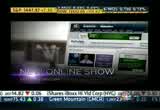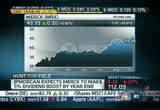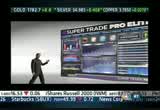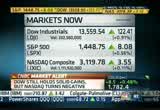tv Power Lunch CNBC October 1, 2012 1:00pm-2:00pm EDT
1:00 pm
in. more "fast at 5:00." power lurch with the fed chairman begins right now. you certainly don't want to miss that. we'll see you tomorrow. we begin this hour with breaking news happening now. fed chairman ben bernanke speaking right now out in indianapolis. he is about to take questions on the impact of the new qe3. in his prepared remarks, a full-throated defense of what he's done policiwise in the wake of the big financial crisis. we're going to bring it to you live. the fed and strong manufacturing numbers out today have the market squarely in rarely mode. the dow right now up 124 points, 1 13,561. let's go where the action
1:01 pm
is. at the nyse. sue herera. >> as we wait for ben bernanke to begin that q&a session, we have a big stock market rally on our hands the first day of the trading quarter, up 123 points right now. bob pisani's joining me now on the floor. you're up a little sigh of relief there. a rally that's carried over to the u.s. but are the underpinnings here at home strong enough? >> new order xoen fent norcompo ism moved the market up in addition to follow-through from europe. the dow industrials were off the high 2-1 advancing to declining stocks. it was 3-1 earlier but you could see we've dipped a little just in the last 15 minutes or so. in terms of what's moving here, well, right across the board, pretty nice rally here. energy materials, industrials, even consumer staples participating in this rally. we're expecting very significant increase in earnings about 20%
1:02 pm
over last year. >> that's almost a 4% gain in goldman sachs. >> look at the overall group moving to the up side. we need some positive earnings commentary from this group for the fourth quarter for the s&p to make numbers. finally, airlines are up as the international air transport association talked about a higher profit outlook for the airlines this year. given the prices i've been paying for travel? there ought to be -- >> you're our leading indicator. >> it hurts! >> absolutely. thank you. see you a little bit later. art cashin is also with us on the floor. director of floor operations with ubs financial services. bob mentioned europe a little bit. but put that aside, as we begin a new quarter, last quarter we were up 4% and the market just doesn't seem to want to give anything back. what do you make of it? >> no. it's behaving very, very well here. although i will say i'm a little disappointed the techs have given up -- >> the nasdaq is only up 2.3 points. >> they're fading fast and going
1:03 pm
toward a flat. but it is mostly about finance and mostly about europe and the sense that maybe things will proceed accordingly and maybe we'll be able to avoid the crisis. we'll cross our fingers and see if they can hold it together. they might get a little weary later in the day. >> how crucial are mr. bernanke's remarks or because we know what the fed is already going to do for the foreseeable future, is the market just going to be looking for a little reassurance? >> i think that's probably the case. he has said that he wanted to do this to kind of explain and justify what the fed is doing which is highly unusual. and it's come within -- from criticism within the fed operation itself. so i think he wants to get out there, make the case, probably say this was not political, it was not for this, this, and this reason, it was in fact trying to make sure the mesh economy was on solid base and that we could get some jobs back. >> we're about four minutes from the beginning of that q&a
1:04 pm
session. we are monitoring mr. bernanke's address, art. we'll bring you the session when it does begin. bond traders also keeping a very close eye on mr. bernanke and his remarks and the upcoming q&a that we'll bring you. rick santelli tracking the action at the cme. reactions? >> i've been phoning around. there is a very common thread especially among a lot of the futures traders. they keyed if on one sentence of ben bernanke. we'll show it on the screen. we expect that a highly accommodative stance of monetary policy remain appropriate for a considerable time after the economy strengthens. and this is what traders were not happy about. i talked to two or three traders that said they're going to be moving now almost exclusively in trading non-financials, commodities, precious metals, and his opinion -- things that the fed can't print. they also think that ultimately it will be the long end of the market that dictates whether rates go up or not and it is
1:05 pm
going to be interesting watching how the fed tries to control the exit if the velocity of money picks up, kind of going back to an op-ed piece written by phil gramm and mr. taylor about two weeks ago. if you look at the charts, ten-year rates that slipped a bit. if you look at the dollar index in gold, they seem to have already keyed in on their moves of the day. it will be interesting to see if q&a changes that. >> the chairman will be wrapping up his prepared remarks in just a moment and then he'll take some questions. meantime our senior economics reporter steve leisman has been monitoring those remarks. you saw, steve, what struck rick as the standout point. what strikes you? >> well, not that. what rick put up there on the full screen was pretty much word for word what the fed said in the statement last week or when the med meeting was held. that's been known by the market. what bernanke's doing is something i guess he's been
1:06 pm
inclined to do individually, but also has to do professional as chairman because of the unique fed policy that's out there right now. didn't have to -- used to be that a fed chairman felt compelled to go out there and really sell his policies to the public. but because this fed is so much in the political crosshairs, because things the fed has done have been so unique, so unconventional, the fed chairman has to go out there and really talk in simple terms to the common man about the policies and try to explain it. there's been a lot of criticism about savers, about the effects of inflation, about the fed monetizing the debt, about the fed going out there and really helping the fiscal authority be reckless with its fiscal policy. so he's out there saying we're not doing any of those things. i thought most interesting was his attempt to say we're not really hurting savers because you can't really save if you don't have a job. you can't save for retirement if you don't have a job. so he's really getting at that public debate that's out there about the effects of fed policy.
1:07 pm
1:10 pm
his prepared remarks, second away to the first questions that he will receive from the head of the economic club of indiana. meantime, steve leisman, what do you expect the first or the most prevalent line of questioning will be? >> it's hard to know. i assume there are a lot of economists in the audience there. i think the big question for the market is going to be what he expects the fed to do in january once operation twist i understand. we had an answer from charlie evans this morning. he thinks the fed should keep adding to its balance sheet. right now what it's doing with operation twist is selling short-term securities and buying long-term ones. the effect of that is neutral as to the size of the balance sheet. charlie evans says he wants to take the $40 billion they're spending on mortgages, continue that but do a total $85 billion net addition to the balance sheet. i'd like to ask fed chairman ben bernanke if that's what he expects. >> let's listen in here. obviously i was struck, steve, by how sort of full-throated --
1:11 pm
i've used that phrase several times and i apologize for that -- but his defense was of fed policy. will that quell any of his critics? >> i don't think so. i think really people have dug in their heels on this. i think the one question and one criticism has been about inflation. to the critics, where is the inflation. >> sorry to interrupt. let's listen to some questions. >> -- the staff will be through to pick them up or you can just bring them here to the front table plp chairman, you mentioned japan and some of the things that we've learned from japan. can you expand a little bit on that? over the last 20 years the japanese economy's gone through some of the things that we've experienced here in the united states. what have we learned from japan and what are the limitations from the lessons we could learn from japan? >> japan was the first, of course, modern economy to be trapped at the zero bound -- that is have short-term interest rates close to 0%. in many ways their experience foreshadowed the global financial crisis of 2008.
1:12 pm
the japanese had a stock market boom and bust and a property boom and bust together which was roughly double the size proportionately speaking to what happened in the united states. so it was a major shock to their economy. they have responded to it through a variety of tools. i think a couple things that we learned from watching their experience and the troubles and difficulties they've been through, and two that i would point to that we have tried to learn from them. the first is, aggressiveness, early aggressiveness of monetary policy. what we learned from japan is we learned from the 1930s, that once you get into deflation, a deflationous situation where prices are dropping, prices and wages are dropping, it can be very, very hard to get out of that. when you're in deflation, there is a lot of downward pressure on the economy. we were very aggressive early on
1:13 pm
in the united states to avoid deflation and we have maintained inflation close to our 2% target which is about where we think it ought to be. low enough so that it doesn't create major problems for businesses, markets and so on, but high enough that we stay away from the deflation boundary which is risky. the other thing which has been important is getting to your banking system and recapitalizing it and getting it back into operation as soon as possible. japanese took a while to do that. for a period of time their banks were not extending credit. not for a number of years. financial crises are difficult for anybody. i don't mean in any way to minimize the difficulties. but what we tried to do in the united states was to address the problem of bank capital very early. in the spring of 2009 when the economy was still deep in recession, financial crisis was still going on, the federal reserve led an effort to stress test all the largest bank
1:14 pm
holding companies in the united states and to determine how much capital they needed not only to be stable, but also to be able to lend and support economic recovery. and whatever capital they didn't have they had to go out and get. this was a very successful exercise. it restored a great deal of confidence in our banking system. over the subsequent months, the u.s. banks went out and raised several hundred billion dollars of new private capital and since that time, of course there's still difficulties in credit markets and lending standards are still tight in some areas. lending has shown rig amount si amount of recovery and banks are back providing credit to the economy. those are some of the things we've learned. but again, i don't want to in any way argue that the japanese were facing anything other than an extraordinary situation. as i said, they were hit
1:15 pm
initially by a shock that was roughly twits size what have we experienced. >> mr. chairman, this is a city where the ideas of milton friedman continue to get a lot of attention. one of our questions via twitter asks how you think milton friedman might have viewed the federal reserve's evolving role over the last five years. >> i think milton friedman -- i'm a very big fan of milton friedman. i knew friedman for a very long time. i was a colleague of his for a while at stanford. i've had many opportunities to talk to him. i spoke at his 90th birthday party. i spoke at some other events in his honor. he's a terrific economist. very insightful. i think he would have supported what we are doing. one of the things that made friedman's reputation was his work with anna schwartz about the great depression. and they pointed to two basic problems and they're very
1:16 pm
analogous. what i was just talking about in the context to japan. they pointed to the inflation, the overly tight monetary policy at the period, and they pointed to the collapse of the banking system and said it was the failure of the federal reserve to address both of those problems that made the u.s. depression as bad as it was. we took that very much to heart. we were aggressive early on. we didn't allow the fact that interest rates were very low to fool us into thinking that monetary policy was as accommodative as it needed to be. and we were aggressive, as you know, in trying to prevent the collapse of our banking ssystem. i think those are all things friedman would have supported. in addition, he very much supported providing enough liquidity to the economy so that the economy could grow and that inflation could be at a low and stable level. and in fact, about a dozen years ago -- i think it was in the year 2000 -- friedman was asked what the japanese should do at that time and he says, well, they ought to go out and buy
1:17 pm
securities which is exactly what the federal reserve is doing now, trying to make sure there is enough liquidity in the system so that tightness in moner to policy, lack of liquidity is not the constraint. now there are many other factors that are holding back our economy. we want to make sure that monetary policy is providing adequate support and i think that professor friedman would have been very comfortable with that. >> can you talk a little bit about the -- what's happening in europe right now with respect to the fact that european central bank and the central banks in various european countries have been taking action. how is that impacting our decision making here and what relationship does that have in terms of the value of the dollar? >> well, we are watching the european situation very carefully. it has been a problem for the u.s.my. we have seen headwind coming from slowing trade and slowing economic activity in europe, and the financial stresses tied to europe have also affected our
1:18 pm
markets, our economy, and so we have a very strong interest in europe solving its problems. in addition, they have so far avoided any real blow-up in their financial system and we anticipate that they'll continue to avoid that. but if that were to happen, that of course would not be confined to europe. its effects would be felt around the world and certainly in the united states. so we have had a lot of interest in following that situation. it is a very difficult, complex situation, made more complex by the fact, instead of having a single government try and decide how to solve these problems, they have 17 countries in the eurozone, each one with its own parliament, each one with its own politics. so the process of making decisions has been very difficult. the problem -- very simple way of looking at the problem is that the 17 countries of the eurozone have a single monetary policy. the european central bank and the euro are analogous to the federal reserve and the dollar in the united states but they have 17 different fiscal
1:19 pm
policies that you're not able to support each other during a period of recession as they're currently in. so what's needed is some ongoing structural reforms that will, first ever all, improve their cooperation, coordination on fiscal policy and they're trying to do that. second very useful step would be what they are calling banking union which is essentially making bank supervision, deposit insurance, oversight, recapitalization responsibilities of europe as a whole and not of each individual country. in order to get to that point they've got to keep stability in the markets and the ecb has done some very constructive things in terms of its long term refinancing operations, in terms of more recent proposals to try to help keep markets stable for at least a period of time. but the ecb's actions, as useful as they are, are not going to solve the problems. they're basically just going to
1:20 pm
provide time. while the ecb provides time, it is very important that the governments of europe work together to provide the structural changes that are necessary. we are pretty confident that the europeans will rise to this challenge. they have very strong interest in preserving stability, preserving the euro. they have very strong political investment in the euro area and the european union as ways of trying to create greater political economy in europe. so there is a lot of incentive to get it done but it will be a difficult task because of the fact you are dealing with in the eurozone 17 sovereign nations each with its own parliament and then additional countries outside the eurozone in european union which have influence on broader policy decisions as well. so it is a difficult situation. we watch it very carefully.
1:21 pm
because as i said, it is not something that's happening over there. if problems increase in europe, we will certainly feel them here in the united states. >> another question we have here is related to something that was said earlier this morning by an analyst suggesting that national brew bureau of economic research will eventually proclaim we're already in recession. this person cited the drop in durable goods orders and the gdp dropping to .1% growth in the second quarter and other weak indicators. i think the question really is, the recession that -- declaration of recession is always a look back. are there indicators that we are moving in a recessionary direction or in fact might already be there? >> so i was once a member of the national bureau of economic research and i was on the little group there that called the 1 ii how to 1 recession -- 2001 recession. i know how it happens.
1:22 pm
it happens sort of over a nice meal in a restaurant. there's a discussion of the data. everybody says, what do you think? everybody says, yeah, okay. the december 2007 turning point -- which i'm being a little bit light here -- but it is a very careful analysis but, nevertheless, it is an imprecise analysis. the termination of the december 2007 turning point didn't happen until like a year after the supposed turning point. it is just very, very hard to identify turning points in real time and the nber looks back a year or more to try to determine whether key variables have moved in that direction. so given that caveat that nobody really knows until maybe some time has passed, right now we see an economy which is expanding. we see employment which is one of the key indicators of recession still growing. so we expect the economy to continue to grow.
1:23 pm
that's our best forecast as of now. we are not expecting a recession. that being said, with an economy which is growing only sort of 1.5% to 2%, that is not fast enough to lower the unemployment rate. that is my concern. if the economy is growing a trend or below trend, that's just enough to help provide jobs for new people coming in to the labor force. it doesn't do anything to eat in to the backlog of the unemployed. and so our unemployment rate of 8.1% currently is really about the same as it was in january. we're not really making progress. at least not this year we haven't made much progress. so our concern is not really a recession. our concern is that growth will continue but at a pace that's insufficient to put people back to work and the longer we go with millions of people out of work and more than 40% of those unemployed have been unemployed for at least six months, the more people who are going to have -- whose skills are going to atrophy, whose ability to find work is going to decline, and we will be creating a permanent group of people who
1:24 pm
are not fulfilling their full potential in the labor force. that i think is very, very costly. that is one of the reasons, perhaps the key reason, why the fed has taken action to try to help support the recovery. >> so sticking with the somewhat lighter vein for a moment, we've got a surprising number of questions about baseball because of your known devotion to the field. so i feel compelled to ask you one baseball question. can we learn anything about the dramatic success of the nationals that might apply broadly to economic policy or monetary policy specifically or visa versa? >> you know, i keep these two issues in different compartments of my mind. so i've been a baseball fan for a long time. think most economists tend to be baseball fans. i think we like all the numbers, statistics and stuff. i don't know. i think the success of the washington team -- i want to see here and now that i've been following them since 2005.
1:25 pm
i'm not a johnny-come-lately, just because they're having a good year. so we've been through a lot of pain as they have improved over time. i think what they've done is is they looked to the future. even when they were really bad, they were trying to hire, scout, sign young players and look towards the future. and i think that's what our economy is all about. we have to look towards the future, think about where we're going to be. we have to make sure our kid are educated so that they're able to contribute to a strong economy. we have to make sure that we're doing the capital, both public and private investment we need to have a strong economy. so i think a future orientation, not always looking backwards, not just looking at the win-loss record this year, is the secret of their success and i think it is an important thing for economic policymakers to think about as well. >> so lot of questions about the dollar.
1:26 pm
i guess the best way to sum up these questions would be what are your concerns about the value of the dollar and maybe related, have the various quantitative easing efforts at some point drive down the value of the dollar? is there sort of a natural limit to how much we can do before there is an impact on the dollar? >> so when people talk about the dollar, they often confuse two very different idea. i think it is important to distinguish them a little bit. the first idea is the buying power of the dollar. how much account dollar buy in terms of goods and services when you go to the grocery store, when you go to the mall, wherever you're shopping. and the measure of the dollar that matters for that definition is inflation. i talked about inflation in my speech. inflation in the united states has been at about 2% now since the mid-90s. the markets expect inflation to stay around 2% going forward. people are willing to lend money
1:27 pm
to the u.s. government for 30 years for less than 3%. and that doesn't sound like a situation where the markets are really expecting high inflation in the future. so i think inflation -- obviously we pay very close attention to it. price stability is critical. but our record has been really good. we are looking at it very carefully. the markets show a lot of confidence in us and so i'm not too concerned about the dollar on that definition. the other definition of the dollar has to do with the foreign exchange value. you think about this when you go take a trip to europe. how many euros does my dollar buy. how many -- whatever other currency that you're trading for. there i would argue that in the medium term our policies are good for that dollar measure as well. first of all, i just note the facts. the facts are that since the crisis or before the crisis the dollar has gone up and down for
1:28 pm
various reasons. the biggest factor affecting the dollar frankly has been fear. when people have become very afraid of a financial situation, or of europe, or whatever, they pile in to the dollar. the dollar strengthens. that's been the biggest factor, risk on and risk off has been the biggest factor affecting the dollar. but putting aside those swings associated with risk on and risk off, safe haven flows, the dollar is about where it was before the crisis now. it hasn't really changed very much in broad terms. moreover, going forward, the fed's mandate you recall is price stability and maximum employment. price stability means low inflation. that supports the value of the dollar. maximum employment means a strong economy. a strong economy means an economy where people will want to invest, where returns are are high, where money will flow in and those will be things that support the dollar in the medium to long term. so i don't see any insontscy
1:29 pm
wi inconsistency in our policy and maintaining a strong dollar. >> i want to make sure we got a question in about unemployment because it is a question i think a lot of people are thinking about. have you been surprised that the policies that have been implemented in the last few years haven't had a greater impact on the unemployment rate and what in your mind are the main explanations for why unemployment is still at the level that it is at? >> well, at some level the issue is not unemployment itself. it is the fact that the economy hasn't grown that fast. the unemployment rate has come down about as much or even a little more than you might expect it would given the speed of growth of the economy overall. if the economy's growing at trend or less, you're just not going to see much progress in unemployment. real question is not is there something wrong with the labor market. i don't think there's something wrong with the labor market. the question is why isn't the economy growing faster. here i just think there are a
1:30 pm
number of headwinds which i talked in more detail during my remarks at jackson hole. there are financial issues early on. there were of course the credit and financial instability issues that we had that were dragging down the economy. i think europe is now a part of the problem. uncertainty that europe is feeding through to a number of our financial variables. so that's one factor. a second factor is fiscal issues. particularly the state and local governments. people may be not -- if you're involved in state government here you might be aware of this -- i'm sure you are aware of it -- but sedate and likele governments have been contracting very sharply, laying off tens of thousands of people, cutting spending back. so the overall fiscal situation -- when you add to that uncertainties about the fiscal cliff, et cetera, et cetera, i think fiscal issues have been part of the reason for a slow growth. a third one is housing.
1:31 pm
we did have a double whammy. we had a financial crisis and housing bubble. they were connected obviously. we had a 30% decline in house prices and a big drop in house construction and house sales. so for a long time that was a major drag on the economy as well. normally in a recovery you would see housing as a big part of that recovery. you'd see housing as a strong sector. we've now begun to see improvement in housing but still not seeing the kind of strength in housing we would normally see at this stage in the business cycle. so there are a number of factors you can point to that help explain why the recovery has not been as fast as we hoped. and the federal reserve was overoptimistic in terms of our forecast of growth. but given that slow growth in output, it is not surprising we have not made more progress in unemployment. but again as i was saying earlier, it is precisely because long term unemployment is such a
1:32 pm
costly thing that we need to get the growth rate up and that's what we're trying to do with the federal reserve. >> please join me in thanking chairman bernanke. >> chairman bernanke concluding his remarks in front of the economic club of indiana. im im's rejoined by steve leisman. there was plenty in that q&a that was interesting to me. do you agree that milton friedman would have supported many of the policies that the fed has embarked upon as a result of the financial crisis, he talked about europe, he talked about the value of the dollar, both in terms of inflation and in terms of foreign exchange rates. and at the end there he basically said unemployment is not a labor market problem, it is a growth problem. >> right. that's his particular point of view, tyler, which is debated in the federal reserve where some members of the federal market committee believe that unemployment is a problem in and of itself resulting from structural changes to our
1:33 pm
economy and that essentially we will not be putting a lot of these unemployed people back to work and that is something that bernanke has essentially rejected. he has said this is a cyclical problem. by defining it cyclically, the key here is he believes it is something that monetary policy can do something about. if it were structural, that's something that would be strictly for the fiscal side of the equation. that would be the key to that right there. i thought it was interesting that he rejected the idea that as far as he can tell we're not in a recession right now, that there are no indicators of that, there is growth in the economy although the growth is slow. in addition his comments on the dollar were interesting that he said, look, if you go back and look before the crisis began, we're broadly unchanged. when it comes to the key measure of the buying power of the dollar, that key measure is inflation. as he did in his prepared remarks, tyler, he insisted that inflation is under control. i know that that is debated among some people here at cnbc. >> absolutely. certainly he did say that the
1:34 pm
markets, given where long term interest rates are, are saying that inflation is not the worry now. steve leisman, thank you. we appreciate it. lots to chew over there, sue herera. >> indeed. we are going to do that after a quick break. we have a terrific panel. bob pisani and art cashin is back with me. the market's lost about 30 points since mr. bernanke started to speak. we'll get you into the afternoon trading session when we come back on "power lunch." greetings from the windy city of chicago.
1:35 pm
people here sure are friendly but some have had a hard time understanding my accent. so to make sure people get every word of the geico savings message i've been practicing how to talk like a true chicagoan. switching to geico could save you hundreds of dollars on car insurance... da bears. haha... you people sure do talk funny. geico®. fifteen minutes could save you fifteen percent or more on car insurance.
1:37 pm
welcome back to "power lunch." let's get you up to date on the market. as you can see, during mr. bernanke's address, we did take a little bit of a dip. we are still up triple digits, up 101 points on the dow jones industrial average but we are well off our best levels of the trading session. nasdaq has now turned negative, down about three points on the trading session. let's talk more about mr. bernanke's address and the markets. bob pisani rejoins me on the floor, as does art cashin of ubs. art, one thing that was a little worrisome to the market was the growth and unemployment statements by mr. bernanke in the q an a session, that there will not be decided improvement in unemployment for a while until we get growth going, that
1:38 pm
the growth is not sustaining any decided improvement in the labor market. >> yeah. i think it was both explanation, defense, and a little bit of frustration combined in all of that. and i think he's concerned -- he tried to be not openly defensive but i think he had a -- don't want to call him light-hearted but he had kind of an upbeat mood to it and seemed to go well but i didn't see any compelling new evidence that would have some of the critics say, you know what? i never understood it like that before. >> this was clearly selling to bernanke. the markets started dropping even before we got the actual text of his statement. i think a lot of people assumed he wouldn't say anything particularly new. he really didn't. accommodative stance. he wasn't that concerned with 2% inflation. what stood out to me was he seemed very relaxed here. more relaxed than perhaps we've seen him before. >> we now know what he's going to do. it's qe to infinity.
1:39 pm
he's going to be there as long as we need him -- >> it's really rare that he would come out and say i was on the economic bureau of research in the 2001 session. we looked around at each other and said, gee, what do you think, guys? it was kind of a very unusual moment. >> he was much more relaxed. i'll agree with you on that. art, this was one of the big events for the market this week but we have a lot of data points still to go and culminating in that employment report out on friday. what's the next big event do you think for this market? >> i would think that you're going to see a lot of focus on the debate on wednesday. people will begin to look at that. as you know, payroll week we get it in drips and drabs. we get the adp estimates, we get the mass layoff reports. so we'll go from day to day with that. i think most of the conversation will now begin to be what's going to happen with the presidential debates. >> we'll watch for that. thank you, gentlemen, very much. as i mentioned, the nasdaq has turned negative.
1:40 pm
let's go to the nasdaq. bertha coombs is following the movers there. >> we're coming off of those lows right now, sue. basically seeing some big caps like microsoft which today gets a downgrade at rbc negleativneg. netflix has better valuation and only a 29 pe versus amazon north of 300. amazon, a pew research survey shows that amazon is really gaining ground when it comes to tablets. a year ago apple had 82% of tablet share. now it is down to 52% according to pew. of that big gain in android, amazon owns 40%. something to watch as we go into the holidays. >> absolutely. thank you. gold prices have closed and we're off of our best levels in gold as well. sharon epperson is here to give us the action down at the nymex. >> hi, sue. still the best day that we've had so far this year for the gold pits. we are looking at a 2012
1:41 pm
settlement high and intraday high here for gold. the intraday high of $1,794. we're off of that just a bit. we start to pare the gains ahead of bernanke's talk and the fact that not much new new came out of it. that's part of the reason traders say we are a little bit off of the highs. we came in with gangbusters to the start of the quarter, the start of the month with a lot of funds buying gold. that helped to drive up the price. add to that the fed official of course this morning on cnbc, charles evans, talking about qe through 2013. that added to it. gold and euros is at an all-time high as spain laid out what the ecb plans to do in terms of bond buying. central bank is going to be key as we look at gold in the coming sessions. >> sharon epperson, thank you. an important new report out today on the state of airline profits right now. and where they are heading for 2013. phil lebeau taking flight for us in chicago. hi, phil. >> these are some encouraging numbers when you look at airline profitability around the world.
1:42 pm
this is what the international air transport association put out today. look at this. airline profits for this year coming in an estimated $4.1 billion. that's the estimate. an increase of just over $1 billion. even more important -- the association estimates that next year the profits will hit $7.5 billion. what's driving this? partially it is because of 4.5% increase in passengers around the world. and really the big growth is coming from the asian airlines. they are driving global profits for the carriers. european carriers, on the other hand, continue to suffer wider than expected losses. there is a little bit of bad news in the forecast. profit margins, razor thin. 0.6% for this year. then when you look at what's happening with cargo traffic, they actually lowered the estimate down to 0.4%. that's how much it is expected to fall this year. if you take a look at the airline index, it is up this year. the question is what do we see happening with jet fuel next year. that's going to drive a lot of stuff. >> wow, profit margin, 0.6% with all those full seats!
1:43 pm
phil lebeau, thank you. to courtney reagan for a market flash. >> let's take a look at chairs shares of bmc software. huge spike out of a report from the "wall street journal" that it could be exploring a sale tapping bank of america looking at a potentially private equity as a buyer. no guarantee, the "wall street journal" says, that the deal will be reached citing sources. we're off the highs but as you can see, that sharp spike worth noting. >> courtney, thank you very much. it is a major exclusive and it is only here on cnbc. julia boorstin one on one with facebook's chief operating officer cheryl sandberg, live at facebook headquarters. >> facebook stock is down over 40% since its may ipo. cheryl sandberg will tell us coming up how facebook is changing -- after the break. tridion safety cell andy which can withstand over three and a half tons. small in size. big on safety.
1:44 pm
hey, it's sandra -- from accounting. peter. i can see that you're busy... but you were gonna help us crunch the numbers for accounts receivable today. i mean i know that this is important. well, both are important. let's be clear. they are but this is important too. [ man ] the receivables. [ male announcer ] michelin knows it's better for xerox to help manage their finance processing. so they can focus on keeping the world moving.
1:45 pm
1:46 pm
nasdaq and russell negative but the dow is much higher by triple digits right now. today's yahoo! finance poll. what describes your investing game plan for stocks in the fourth quarter? 30% say keep investing, ride the rally. 21% say take some back. correction protection. and 49%, half of you, say hold tight. just watch and wait. let's see what's coming up on street signs. ty, coming up at the top of the hour, the assets class some say may be forming a new bubble. and it is actually going to surprise you. also, the reviews are in. we have what is the most raved about tech gadget of the year. later on we're going to be joined by founder of fertilizer company agrim. he joins david faber for an exclusive interview on street
1:47 pm
sign at the top of the hour. guys, back to you. >> turning up the heat on fertilizer. can't wait. cnbc has been airing our exclusive interview with facebook's chief operating officer cheryl sandberg. it is her first sit-down since the ipo debacle of the spring. so what are the biggest changes she's been making since then? julia boorstin is live at facebook headquarters. hi, julia. >> reporter: cheryl sandberg tells me that facebook has changed since its ipo. after years of focusing on the company's products, the stock's dismal performance is pushing facebook to look for new ways to make money. here cheryl sandberg reveals how facebook is shifting gears. >> already in the last couple months you've seen us roll out products pretty aggressively. we've rolled out facebook exchange, custom audiences, new mobile ad formats, revamped our
1:48 pm
offers. all of these do one thing which is they help make ads more targeted, more useful and more effective for marketers on facebook. >> do you have any new ad products that you haven't announced yet? >> many. one of the things i think you can always expect from facebook is continual iteration. we roll out products very quickly. we change our products very quickly. but we think that's really important to continue to develop the products. >> facebook's ad growth has been decelerating. what are you telling wall street? >> our growth is something we care a lot about. we believe we have the biggest opportunity to grow revenue ahead of us. we are the largest -- we are the largest community of engaged users anywhere in the world. every day on facebook we have five super bowls which means you can reach that many people. increasingly as advertisers are learning to work with a platform, they're learning and we're helping them learn what works and how they can use this to generate sales. but we think our results are
1:49 pm
very strong and that we believe we can prove to advertisers that not only do they get a good return on facebook ads but they get a better return on facebook ads compared to most things they do. >> so you think facebook's business model has changed dramatically since the ipo? >> the business model hasn't changed. we are increasing our focus on monetization. the cornerstone of our business is advertising, and in that advertising opportunity it is a $600 billion business where our results with our clients show that we return results which are in many cases much better than the return they get anywhere else. that's a really unique opportunity. if you want to -- if you're a business and you want to connect with people but you also want word of mouth to spread against your business, there's no better opportunity out there. i think what we've done since the ipo is continue to really focus on building that business and i think we're executing better and better. >> sandberg told me she's still facing skepticism from madison
1:50 pm
avenue base facebook ads are such a new format which is why it is so important for facebook to focus on measurement. another place facebook is looking to make money is mobile. coming up, i'll have cheryl sandberg's thoughts on how she's tackling the mobile problem at facebook. >> the key phrase in that whole bite there i think was increasing our focus on monetization which is exactly what you said. they're focused more on making money. let's take a look at a photograph, though. mr. zuckerberg, the founder -- one of the co-founders, meeting with the russian prime minister dmitry medvedev. look at mr. zuckerberg wearing a suit but giving him a t-shirt. should we read anything into this? >> look, we have to remember that zuckerberg also wore a suit when he met with president obama so he's willing to put on a suit if the occasion merits it. and i think it shows that he's really trying to expand facebook overseas and facebook does have a huge number of international users but the monetization to go
1:51 pm
back to that word -- facebook isn't making as much money overseas as it is here in the u.s. as a user. that has to ramp you were and i think he is in russia to try to get that started. >> let's look at where facebook's stock stands right now if we can put that up to see how it has performed today as we roll out the chunks from your -- it is up 1.5% on the day as you see there at $21.98. sue? if you're looking for yield in this low interest rate environment -- who isn't -- check out big pharma. which companies may be preparing to boost their dividends coming up. as we head out, here's how the five biggest dividends in the dow jones industrial 30. our favorite, intel, up 1.68%. when you take a closer look... ...at the best schools in the world...
1:52 pm
...you see they all have something very interesting in common. they have teachers... ...with a deeper knowledge of their subjects. as a result, their students achieve at a higher level. let's develop more stars in education. let's invest in our teachers... ...so they can inspire our students. let's solve this. like in a special ops mission? you'd spot movement, gather intelligence with minimal collateral damage. but rather than neutralizing enemies in their sleep, you'd be targeting stocks to trade. well, that's what trade architect's heat maps do. they make you a trading assassin. trade architect. td ameritrade's empowering web-based trading platform. trade commission-free for 60 days, and we'll throw in up to $600 when you open an account. governor of getting it done. you know how to dance...
1:53 pm
1:54 pm
1:55 pm
>> cash balances across the pharma sector are increasing. jpmorgan says we could see more cash being returned to shareholders per dividend. pfizer in the last five years has increased its dividend three times, 10%, 11%, and 12.5% respectively. jpmorgan also expects merck will generate roughly $45 billion, or 40% of its current market cap in post-dividend free cash flow through 2017 and it anticipates much of this capital to be returned to shareholders over time. let's keep in mind, four of the largest pharmaceutical firms on average already offer a dividend yield of 4% which is roughly 2% higher than stocks on the s&p 500 and vastly outperforms the 10-year treasury note. even when comparing pharma to other sectors on an aggregate basis, pharma represents the second biggest contributor of any industry, around $26 billion. that major takeaway, it could
1:56 pm
1:58 pm
1:59 pm
let's take a look at where the market stand. the dow industrials remain the standout here, up 122 points. the s&p .5% higher. nasdaq is sort of the trailer here, up just three points or .1%. >> it really is, ty. briefly for a short time here, the transports moved to the negative side. that's what everybody is looking at. you see that dip down from the best levels of the day. we did move into negative territory and all the dow theorists are going to watch to see whether we can actually close the day with a gain. keep your eye on the trends. >> it is going to be a very intereg
124 Views
IN COLLECTIONS
CNBC Television Archive
Television Archive  Television Archive News Search Service
Television Archive News Search Service 
Uploaded by TV Archive on

 Live Music Archive
Live Music Archive Librivox Free Audio
Librivox Free Audio Metropolitan Museum
Metropolitan Museum Cleveland Museum of Art
Cleveland Museum of Art Internet Arcade
Internet Arcade Console Living Room
Console Living Room Books to Borrow
Books to Borrow Open Library
Open Library TV News
TV News Understanding 9/11
Understanding 9/11